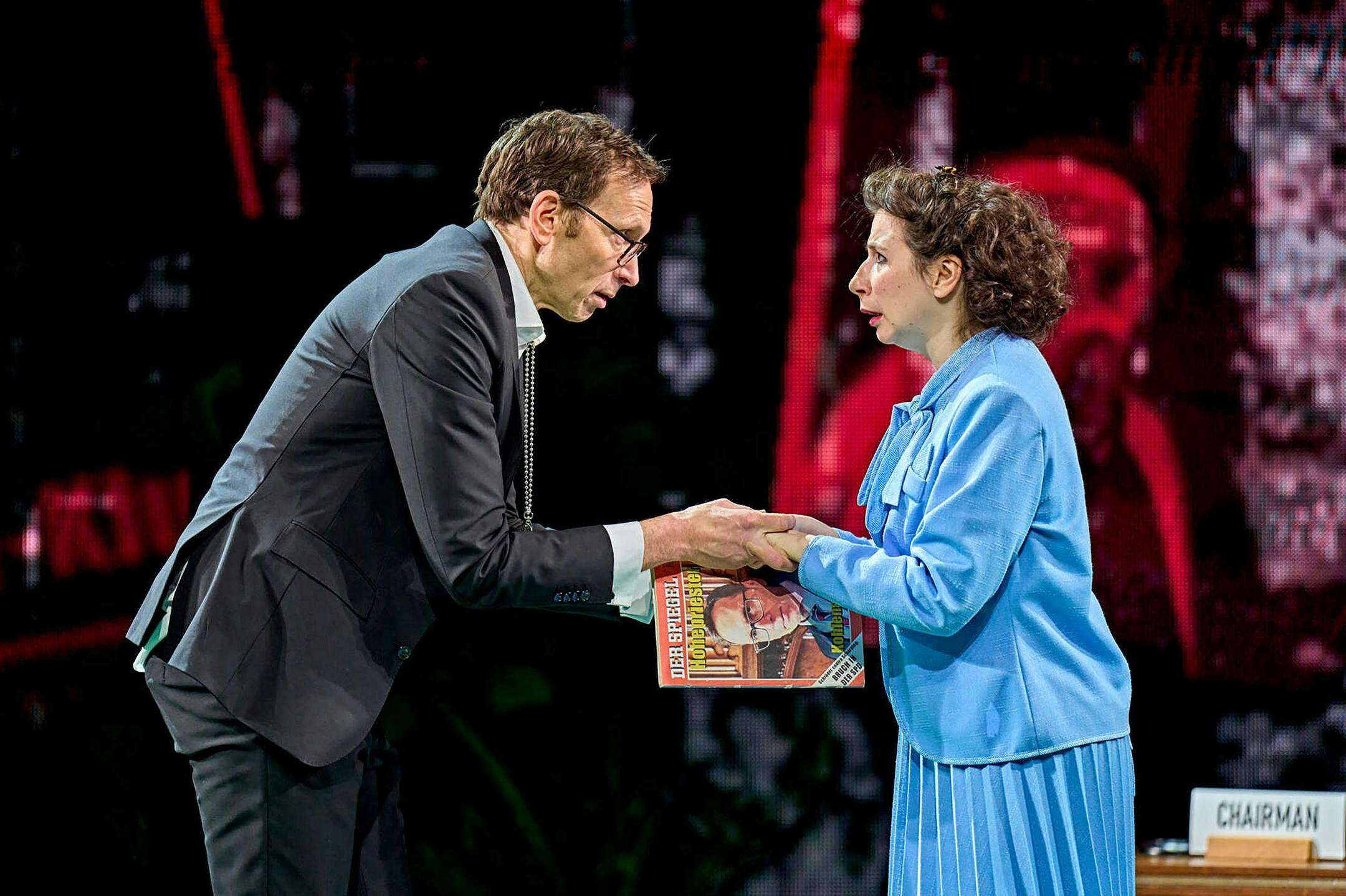This article is taken from the March 2025 issue of The Critic. To get the full magazine why not subscribe? Right now we’re offering five issues for just £10.
It’s a rare theatregoer who thinks, “I’m in the mood for a two and a half hour play about a 1997 climate change summit”. Much of the drama produced during the Greta Thunberg era has appealed largely to the already convinced who want to see their own anxieties and sense of urgency reflected on stage. But flops such as the National Theatre’s Greenland in 2011 dissuaded commercially-aware theatre companies from mounting ambitious productions on the topic.
That means the international attempts to tackle global warming have gone largely unexamined by playwrights. Since the first meeting of the UN World Climate Conference in Geneva in 1995, there has been a running diplomatic circuit: latterly the bizarre COP summit in Baku, where I listened to the host’s welcome speech in praise of oil as a “gift from the gods” whilst our energy and climate change secretary, Ed Miliband, squirmed in the VIP section.
These sorts of events are fertile territory for stories: they are hot-house meetings where hopes, rows and intrigue bring dry protocols and document-drafting to life. The RSC’s Kyoto takes us on the rocky road to a meeting in the ancient Japanese capital — a marathon involving characters ranging from John Prescott as the deputy prime minister to Tony Blair, to Germany’s rising-star environment minister, Angela Merkel.
A tough-minded US delegate sent forth under Bill Clinton to set ambitious targets for curtailing greenhouse gases tweaks the baseline of measurements to protect US industry. It is a reminder that even the saints of the climate story have a habit of putting their own interests ahead of those of poor old planet earth.
Writers Joe Murphy and Joe Robertson follow in the footsteps of J.T. Rogers’s play Oslo (about the doomed Palestinian–Israeli Oslo accords) and David Hare’s excellent meditation on the run-up to the Iraq war, Stuff Happens, in that the action focuses on the processes and events behind negotiations, with Stephen Daldry and Justin Martin directing a fizzy-paced production.
The RSC famously lacks a London home, which has limited its impact in the capital. This time, the Soho Place theatre, a bland conference-style building, fits the bill as a forum for a huge round table and a lot of flickering CGI to get through the graphs-and-charts background.
What it needs to slice through the layers of governmental bickering is a baddie. Happily, the story has a delicious one in the form of the (real-life) US lawyer turned oil industry lobbyist, Don Pearlman, who had served in an energy department role under Ronald Reagan and was hired as a lobbyist by the giant oil and gas companies to throw legal spanners in the works of the UN conferences (he took to the role with such gusto that he had to be banned from the conference floor, having somehow acquired a delegate pass).

Pearlman is played by Stephen Kunken, an A-grade serial villain on TV in shows from Billionaires to The Handmaid’s Tale. Pearlman is cynical and committed to blocking agreements on targets. There is a neat study in twin obsessions here — he was as determined to block agreements as the wily Argentinian Raúl Estrada-Oyuela (Jorge Bosch) was to forge them. Their duelling scenes are a cat-and-mouse delight.
Air miles add up as the delegates meet in Rio with the German filmmaker Werner Herzog moodily showing them the stars above the threatened Amazon rainforest. This, as Pearlman notes, brings emotion and the beginnings of a powerful new climate movement into the arid story of UN meetings: “I mean, for us it was an effing DISASTER!”
The meat of the story is the interplay of electoral politics with the forging of a deal between the US and a fast-emerging China. Estrada-Oyuela chairs proceedings with magisterial use of the gavel. At one point (another true story) when ill temper and exhaustion have led to a bickering delivered in Babel-esque multiple languages because the interpreters have gone home, he locks the delegates in the room without lunch, which results in Prescott furiously eating grapes and drawing on his old shop-steward background in order to force a breakthrough.
The final scenes suggest that Pearlman was ultimately dropped by his oil industry masters in favour of softer forms of lobbying (the era of oily arts sponsorship beckoned). He dictates a voicenote to his Democrat son, acknowledging that his era is drawing to a close, and a different set of views will succeed him. “It’s your world now,” he tells him.
Not so fast though. Pearlman, who died in 2005, might have found his approach back in fashion in the new Trump “drill baby drill” era. Net Zero policies, which arose from the target-setting of Kyoto and Paris, divided opinion across the political spectrum and fuelled a backlash. The conference circuit feels more like a legacy than a guide to the future. In the play, our doughty convenor sought “the smallest zone of agreement” between countries and leaders to overcome differences. These days, someone else is holding the gavel.







